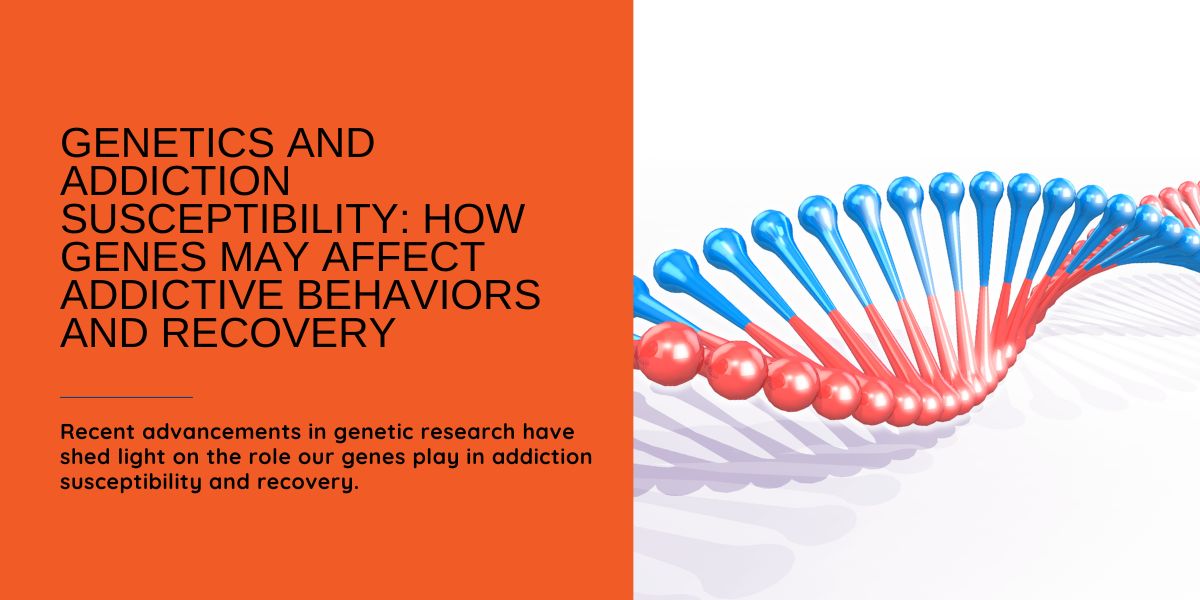Genetics and Addiction Susceptibility: How Genes May Affect Addictive Behaviors and Recovery
Unraveling the Genetic Threads of Addiction: How Our Genes Influence Vulnerability and Resilience

Genetics and Addiction Susceptibility: The Role of Genes in Addictive Behaviors and Recovery
Addiction is a complex and often challenging struggle, that impacts individuals from all walks of life. Recent advancements in genetic research have shed light on the role our genes play in addiction susceptibility and recovery. In this in-depth exploration, we’ll unravel the intricate relationship between genetics and addiction behaviors, offering insights into how our genes may affect vulnerability to addiction and influence the path to recovery.
Introduction: The Genetics and Addiction Susceptibility
Understanding addiction as a multifaceted issue involves considering both environmental and genetic factors. While environmental influences are significant, our genetic makeup contributes to the unique vulnerabilities and strengths individuals bring to the complex terrain of addiction and recovery.
The Dual Nature of Addiction: Genetics and Environment
Addiction is often described as having a dual nature—shaped by both genetic predispositions and environmental triggers. We’ll delve into how genes may set the stage for addiction susceptibility, exploring the interplay between genetics and environmental factors in the development of addictive behaviors.
The Genetics of Substance Use Disorders
Genetic Markers and Risk: Exploring Key Players
Certain genetic markers have been identified as potential contributors to the risk of developing substance use disorders. We’ll explore specific genes associated with addictive behaviors and how variations in these genes may increase susceptibility to different substances, from alcohol to illicit drugs.
Neurotransmitters and Addiction: The Dopamine Connection
Dopamine Receptors and Reward Pathways: Genetic Variations
Dopamine, a neurotransmitter linked to pleasure and reward, is crucial in addiction Genetic variations in dopamine receptors and related pathways can influence an individual’s response to substances, shaping their susceptibility to addiction. We’ll unravel the genetic intricacies of dopamine’s role in addictive behaviors.
Genetic Factors in Behavioral Addictions
Beyond Substances: The Genetic Landscape of Behavioral Addictions
Addiction extends beyond substance use, encompassing behavioral addictions like gambling and gaming. We’ll explore the genetic factors that may contribute to the development of behavioral addictions, shedding light on the shared and distinct genetic elements between substance and behavioral addictive disorders.
Genetics and Dual Diagnosis: Understanding Co-Occurring Disorders
Comorbidity and Shared Genetic Vulnerabilities
Individuals with addiction often experience co-occurring mental health disorders. We’ll examine the shared genetic vulnerabilities that contribute to the coexistence of addiction and mental health conditions, emphasizing the importance of a comprehensive and integrated approach to treatment.
Recovery and Genetics: The Role of Resilience Genes
Resilience Genes and Recovery Potential
While influence vulnerability to genetics and addiction, they also play a crucial role in an individual’s ability to recover. We’ll explore resilience genes—genetic factors associated with enhanced recovery outcomes—and discuss how understanding these genes can inform personalized treatment plans.
Precision Medicine in Addiction Treatment
Tailoring Treatment Approaches: The Promise of Precision Medicine
Advancements in genetic research have paved the way for precision medicine in addiction treatment. We’ll discuss how genetic testing can inform personalized treatment plans, guiding healthcare professionals in selecting interventions that align with an individual’s unique genetic makeup.
Environmental Factors and Epigenetics: Shaping Genetic Expression
Epigenetics and Addiction: How Environment Modifies Genetic Expression
Epigenetic changes, alterations in gene expression influenced by environmental factors, play a significant role in addiction. We’ll explore how environmental triggers, such as trauma and stress, can modify genetic expression, contributing to the development and perpetuation of addictive behaviors.
Supporting Recovery: A Holistic Approach
Integrating Genetics into Recovery Support Programs
Understanding the genetic aspects of addiction provides an opportunity to enhance recovery support programs. We’ll discuss how incorporating genetic insights into therapy, counseling, and support groups can contribute to a more holistic and effective approach to addiction recovery.
Conclusion: Navigating the Pathways of Genetics and Addiction Recovery
In conclusion, the relationship between genetics and addiction is a dynamic and evolving field of study. By unraveling the genetic threads of addiction, we gain valuable insights into vulnerability, resilience, and recovery. Recognizing the interplay between genes and environmental factors allows for a more comprehensive understanding of addiction and informs a personalized, compassionate approach to treatment and recovery.




